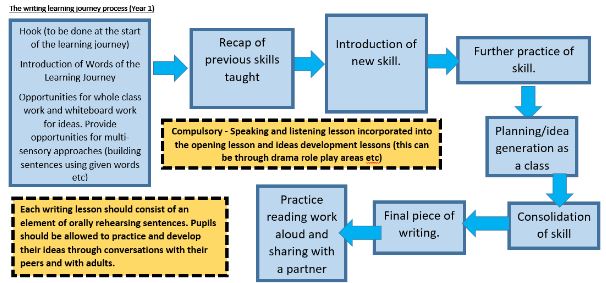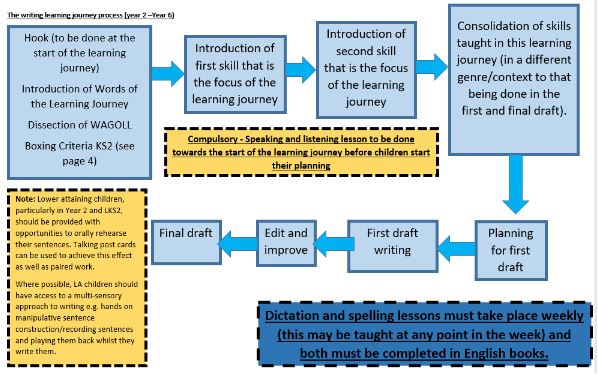English
Please click HERE to see an overview of what English is taught in each year group.
Subject Intent
Whitehill Primary School has a reading centred approach to the teaching of English. Throughout the school we put high quality texts at the centre of our curriculum. This allows us to provide challenge, thought provoking activities that are centred around an ambitious and progressive curriculum.
Within English, we believe that providing children with the ability to become strong readers that enjoy reading is central to equipping them with the knowledge and skills that they need in the future. Our curriculum, through enrichment linked to high quality texts, enables children to take part in a range of experiences that may not normally be accessible to them. We ensure that children receive a range of texts from a variety of cultures in order to reflect the vibrancy and diversity of our local community and to provide children with settings and characters that they can relate to.
We want our children to read and write for pleasure using a variety of text types. As such, we have a curriculum that is richly designed to provide children with opportunities to read/write fiction, non-fiction, poetry and a variety of other text types. We instil in our children the importance of discussion to learn; they are taught to be able to elaborate and explain clearly their understanding and ideas. We believe that children should be able to speak and write fluently so that they can communicate their ideas and emotions to others and through their reading and listening, others can communicate with them. Children can develop, embed and master these skills in other areas of the curriculum and through enrichment activities that they take part in.
For our early readers in school, we use Jolly phonics to support the acquisition of phonics. Pupils in EYFS to KS1 partake in phonics activities daily in order to support and develop their reading skills. We believe that the acquisition of early reading is essential for developing happy, independent lifelong readers.
To further embed our pupil’s love of reading, we believe that children should have access to quality texts. As such we use the accelerated reader programme in order to promote reading within school. This allows children to read a whole range of texts without having to work their way through a scheme. It means that children have access to texts that they enjoy. By doing so, we are encouraging children to read a range of different genres independently.
At Whitehill we believe that inclusivity is an essential aspect to any part of the curriculum. Within English, this is reflected in the choices of texts we have chosen - ensuring that children have access to challenging texts that they are supported to read. English is taught through a multisensory, scaffolded approach to enable all learners to access each part of the English curriculum.
Aims & Expectations
Writing
To ensure coverage of the National curriculum teachers will use the writing progression document for their learning intentions. This shows a full breakdown in all areas of the NC for writing including spelling, handwriting, grammar and composition.
Each term there should be the following coverage:
- There should be at least five learning journeys across each term (fifteen across the academic year)
- Two learning journeys must be linked to another area of the curriculum with at least one linked to History or Geography
- Three learning journey’s must be linked to a high quality text which is also your class novel
- One learning journey is open and can be based on anything you decide. This can be a video, current affair issue, an exciting scenario in school etc.
- Across the academic year, out of the fifteen learning journeys you are expected to cover, six should be fiction (this can include descriptive writing), six should be non-fiction and three should be poetry based. At least 1 should be linked to other cultures and 1 should have some form of PSHE link (e.g. bullying). However, these can come from texts, videos, wider curriculum etc.
Using high quality texts -
Writing learning journeys linked to texts should utilise high quality and age appropriate texts. These should include challenging vocabulary and should be exciting and engaging to read. There should be one novel read with the children each half term. The books should be selected from our collection of books within school (please see the list at the end of this document). Teachers should select books that they know pupils will enjoy and select the choices from your relevant year groups.
Spellings
Learning Journeys
Lessons will be broken down into learning journeys that will take place over roughly a 2 week period. In year 1, each task will be focused on 1 skill which will be embedded over the period of lessons. Teachers will place a huge focus on oral rehearsal on written sentences before moving on to writing sentences down. Pupils will then be given time to re-read their work and discuss it before moving on. Where possible, teachers will use a multi-sensory approach to the teaching of writing in order to support students with learning difficulties. This may include but is not limited to: hands on sentence building activities, writing sentences in the air whilst saying them, vocalising their words as they write, writing words being repeated by another pupil/adult and discussion about all aspects of sentence work.
Figure 1. A flow chart displaying the weekly outline of a writing plan.

From year 2 onwards, pupils will work on 2 skills per learning journey (In year 2 there may be some need for the teachers to use the year 1 format at the beginning of the year. This can be done at the teachers discretion but children, by the end of the year, should be working on 2 skills). The focus will then become on editing and redrafting using the particular skills they have been learning. Teachers have the discretion to extend the amount of time they spend practising and developing skills at sentence level however the expectation is that the overall period of a journey will be no more than 3 weeks. Teachers will also be expected to incorporate a lesson of spelling and dictation into their week's work. This will allow them to select spelling patterns and spellings from the national curriculum that match the style of writing the pupils are doing. This will allow pupils to embed those spellings within their own work as well as practice them at home.
Figure 2 - years 2-6 writing learning journey flowchart.

All learning journeys should begin with a hook to engage the pupils, the aim of which is to develop excitement and enrichment into the reading and writing within the curriculum. To further enhance this, teachers have the scope to select the books and topics that they wish to write about. This will allow teachers the freedom to engage in topics that the children are interested in.
In writing, the skills will be focused on sentence level writing. Developing and improving sentence structures over two or three lessons. This has been proven a highly effective method of teaching both those children with special needs and more able children as it allows them to extend their thinking.
Reading
Within Whitehill we wish to develop readers who achieve a high level of automaticity and a passion for reading. In KS1, much of the early acquisition of reading is taught through the Jolly Phonics programme. This is further embedded in class where teachers are expected to use class texts to support learning in writing and reading. The texts should cover a wide range of materials including traditional tales, nursery rhymes and poems, fiction and nonfiction.
In year 1, the focus for children should be on reading for pleasure and fluency. Children should be read with on a 1:1 basis at least once a week. Teachers should also introduce children to a range of different texts through story time and children should be provided the opportunity to select books to read as a class. Children should be encouraged to read the same books multiple times if they wish to do so (this promotes fluency and reading for pleasure). Comprehension objectives such as retrieval, inference and prediction should be met through discussion as a class and role play activities.
In years 2-6, where possible, the reading lessons should feed into the writing lessons e.g. using a whole class text as inspiration for a piece of writing. Teachers should aim for all pieces of writing to have a reading link (fiction and nonfiction) e.g. if using a modern day event it could be supported with newspapers. This text may not be enough to support reading lessons as well as writing lessons due to coverage opportunities. If this is the case, then reading should be taught separately from writing.
There should be at least five lessons of reading per week and five lessons of writing per week totalling 1hr 15 minutes per day. Teachers have the autonomy to decide the allocation of the timings of these lessons (some days, writing may need less time than reading and vice-versa).
At least 2 of the reading lessons should be focused on decoding and fluency. This should involve the majority of pupils reading an age related text. The weaker pupils can then be supported by higher achieving pupils. One of the sessions should be focused on paired reading. This will mean the higher ability pupil and lower ability pupil read at the same time. The higher ability pupil should stop reading and listen carefully to the LA pupil. When they begin to struggle, the HA pupil can jump back in to support. This is a highly effective, research based approach to developing reading fluency. It creates an auditory response that helps to develop pathways in the brain and is proven to develop children’s ability to read.
The other fluency lesson may take other methods for example: whole class choral reading, “jumping in” reading, paired reading, group reading etc. Where pupils are not able to access age related materials, they should be reading a phonetically decodable text that matches their ability level. They should be reading out loud to an adult/with an adult using the same methods described above (this can be achieved at small group level as well).
2 more lessons of the week should be skills based e.g. retrieval, inference summarising etc. Teachers can select the objectives for their relative year group from the curriculum overview. This will allow us to ensure that the curriculum is covered as well as allowing us to develop our pupils' understanding of the skills required in reading. At least 1 of these lessons should have a written outcome.
The final lesson should enable the children and teaching staff to share their pleasure of reading. This can be achieved in a variety of different ways. It can be achieved through storytime, booktalk (allowing children to have structured conversations about books they are reading currently), writing book reviews, quiet reading and 1:1 reading with an adult.
Click HERE to access information on Accelerated Reader.
Inclusion & Equal Opportunities
At Whitehill, we believe that inclusion and equal rights are key to providing a safe place where children can thrive and learn. As such, the English curriculum has been designed to give teachers much more ownership of their pupil’s learning. The aim of this is to allow teachers to select aspects of the curriculum, not only that their pupils enjoy, but which will make them feel included in the Whitehill family. Teachers have the freedom to select books that match the demographic of their class so that pupils feel welcome. This is not only linked to books. The writing learning journeys can be developed based around topics/issues both locally, nationally and internationally. This will provide scope across the curriculum for pupils to engage in activities that they can feel a part of.
Further to this, the curriculum is designed to support all children in their learning. The English curriculum is aimed at providing all pupils with the confidence and ability to make excellent progress. The use of multi-sensory techniques will be embedded into lessons to support the SEN children within the school whilst the greater depth children will be challenged and extended through higher order thinking when reflecting on their own work and writing styles.
Parental Involvement & Wider Community Links
Parental involvement is an essential aspect to English, especially for the early acquisition of reading. It is crucial that the school and parents work together in order to support the pupils at Whitehill. In order to achieve this, there is an expectation that teachers will check the contact books of pupils within school. There is also the expectation that parents will read with their children.Furthermore, we would like to invite parents into school to do “reading events”. This will allow parents to come into school to share some of the class's story but also to read with their children in the school environment. We will also run workshops with parents to show ways of supporting and developing reading at home.
Monitoring
In reading and writing we will use target tracker as a way of monitoring assessment. Teachers will upload data to the Target tracker system 3 times per year. This will allow us to monitor and assess areas of strength and weakness. To further support this assessment, we will have in house moderation meetings where we can discuss needs and challenge each other regarding our assessments. To help teachers assess in reading we will continue to use the NTS reading assessments 3 times per year. We will also assess pupils on their fluency in reading. Teachers can then amalgamate their knowledge of the pupil and assessment results to finalise their decisions.
Monitoring will also be carried out by the leadership team and the English lead through the means of book looks, lesson observations, pupil voice and learning walks with a focus on learning and progress. Through consultation together they will be able to assess the effectiveness of the curriculum and plan suggestions and next steps for moving forwards.


